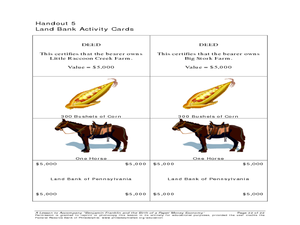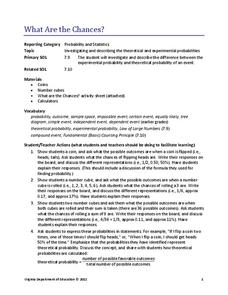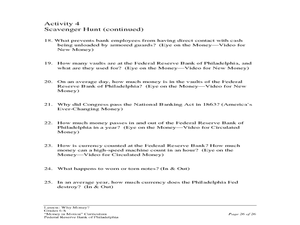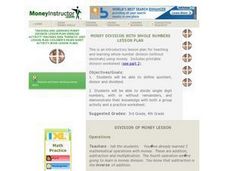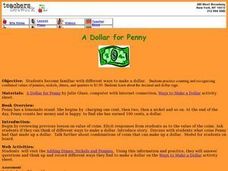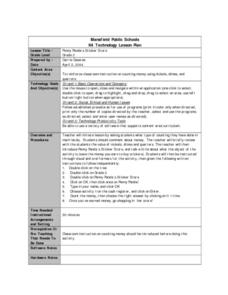Curated OER
A Lesson to Accompany "Benjamin Franklin and the Birth of a Paper Money Economy"
Young scholars investigate the role of money in the colonial economy. In this colonial economy lesson, students participate in a trading activity, read the booklet "Benjamin Franklin and the Birth of a Paper Money Economy," participate...
Virginia Department of Education
What Are the Chances?
Take a chance on an informative resource. Scholars conduct probability experiments involving coins and number cubes to generate data. Compiling class data helps connect experimental probability to theoretical probability.
Curated OER
Math-Money
Students complete money matching worksheet. They work with an aid or peer tutor with coin tray, name each coin shown (use native language or alternative speech method). Alternative assessment methods are used.
Curated OER
Shopping with Money
Students apply their knowledge of addition and subtraction of money into real life situations.
Curated OER
Technology: Money Equivalency
First graders,working on computers, drag coins into boxes to equal amounts pictured. Following a demonstration, they demonstrate how to type number sentences. As an extension, 1st graders create equivalent amounts using specific numbers...
Curated OER
Math & Science
Students are introduced to techniques to help with with math and science. In groups, they use a worksheet to discover how to count money. As a class, they watch a PowerPoint to define terms associated with science. To end the lesson,...
Curated OER
Why Does Money Have Value?
Learners study money and its value and usage in the world today. In this economic lesson, students research money as they learn what it stands for, why it is important, how it is valued and what it represents in the United States.
Curated OER
Why Money?
Students participate in a trading simulation to learn about barter and the benefits of using money. In this barter lesson plan, students participate in a trading simulation and learn about coincidence of wants. Students then use money...
Curated OER
Count Coins and Bills
Students study the names and values of different denominations of paper money, count sets of money that include both coins and bills. They complete a money chart, read and solve word problems.
Curated OER
Money Division With Whole Numbers Lesson Plan
Students define quotient, divisor and dividend. They divide single digit numbers, with or without remainders, and demonstrate their knowledge with both a group activity and a practice worksheet.
Curated OER
Test Your Reading Skills- Reading Comprehension 6 – How Much Money Do They Have?
In this reading comprehension worksheet, 6th graders read sequential sentences in order to determine the amount of money each of the named people has. They must use addition and subtraction along with the reading comprehension skills to...
Curated OER
Math Investigations
Students demonstrate how math is used in everyday life. In this math investigation lesson, students develop a class-list of ways they use math everyday. Students define math vocabulary words, such as "counting," "daily life," and "measure."
Curated OER
A Dollar for Penny
Students demonstrate different ways to make a dollar. In this consumer math lesson, students read the book A Dollar for Penny and identify the value of each coin. Students determine combinations of coins that can make up a dollar.
Curated OER
Saving and Investing
Fifth graders participate in activities to promote understanding of investing and saving. In this saving and investing lesson, 5th graders design a portfolio, play a card game and write a skit about the importance of investing.
Curated OER
The Big Buck Adventure
Learners practice making change, and adding and subtracting money. In this money lesson, students listen to a reading of The Big Buck Adventure by Shelley Gil. They access teacher assigned web sites to practice making change, adding...
Curated OER
Savings Accounts and Interest
First graders study money, banks, and getting interest on money. In this consumer math lesson, 1st graders listen to Stan and Jan Berenstain's, Berenstain Bears' Trouble With Money. They use the concepts in the book to discuss...
Curated OER
Flipping Coins: Density as a Characteristic Property
Young scholars explore linear functions in a crime solving context. They collect and analyze data using linear equations, then interpret the slope and intercepts from a linear model.
Curated OER
Deena's Lucky Penny
Students discover the coin denominations of U.S. Currency. In this money instructional activity, students read the book Deena's Lucky Penny, then complete a coin matching activity using the Internet. Students also read Shel...
Curated OER
Spending Plans
Students explore the concept of dividing their money into categories, namely "save," "spend," and "share." They engage in activities that help them explain that money is limited in quantity and must be divided for different purposes.
Curated OER
Shopping for Candy
Students explore counting money. In this money counting and gingerbread house construction lesson, students use a calculator to determine how much and what type of candy they can buy given 25 cents. Students construct gingerbread houses...
Curated OER
Estimation
Third graders practice using money. For this estimation lesson, 3rd graders show their ability to figure out the cost of lunch. Students then set up a "store" and students choose the products and estmate the cost. Students visit websites...
Curated OER
Short-Term and Long-Term Savings Goals
Fifth graders discover how saving money can apply to their lives. In this personal finance lesson, 5th graders use the book The Leaves in October, as a conversation starter on income, savings and setting goals. Students explore the...
Curated OER
Penny Panda's Sticker Store
Second graders practice counting money using nickels, dimes, and quarters. They review the value of nickels, dimes and quarters. They explore Penny Panda's Sticker Store, and talk a little about what the object of the activity is (save...
Curated OER
Common Sense Cookie Shop
First graders shop for a bag of cookies using toy money. In teams, they choose which variety to buy and decides which bills and coins are necessary to buy the bag of cookies and a cashier makes change. They tally the cookies purchased...


